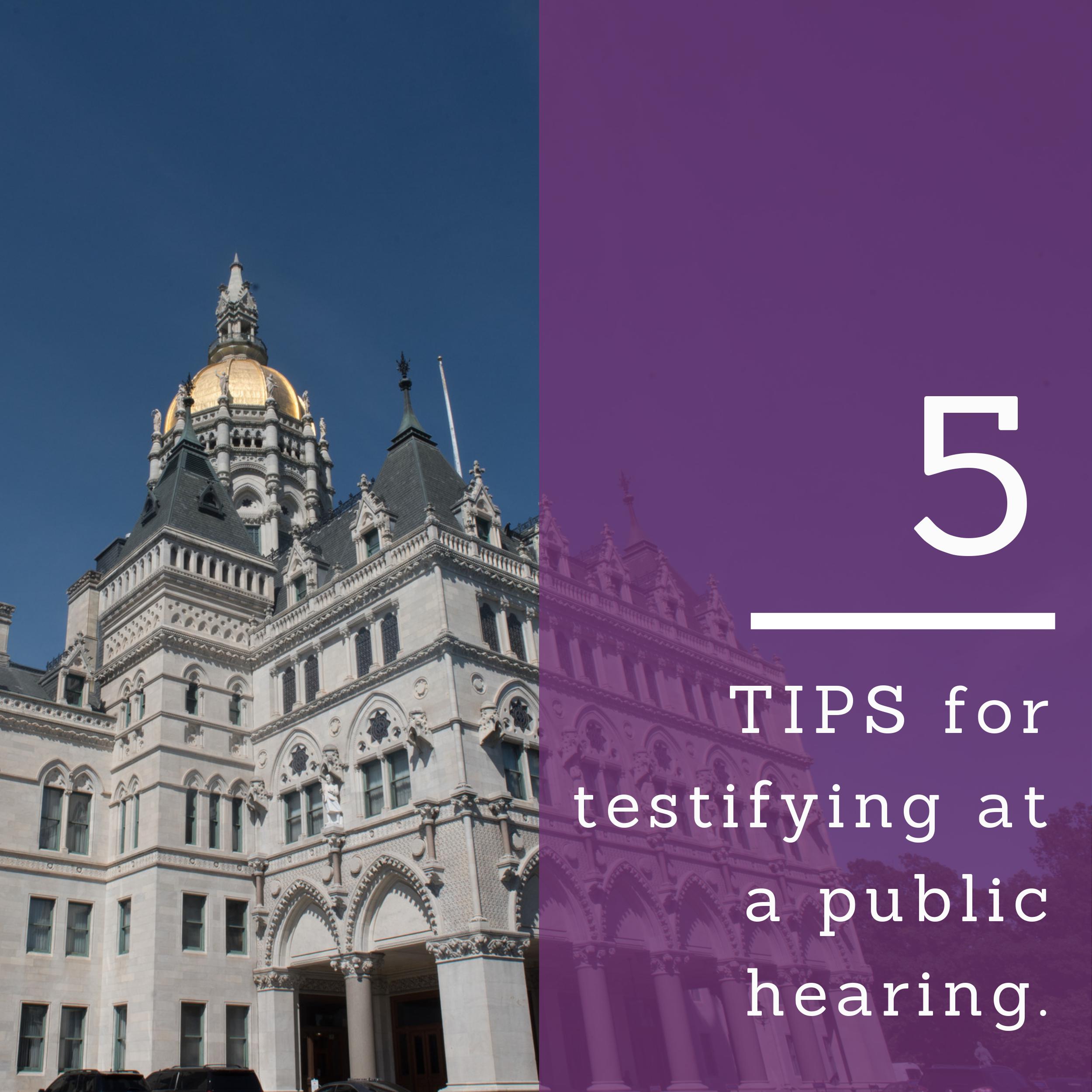Today, our new VP of Policy and Communications, Paul Mounds Jr., shares his tips for testifying at a public hearing.

The General Assembly is in session, which means legislators are holding public hearings. These are the public’s chance to weigh in on important issues. Having spent many years in government, I am familiar with this process, but for those who aren’t, it can be intimidating.
Here are some tips to try to make the process less daunting – and to help make your voice more likely to be heard.
Step 1: Preparing to testify
Start off by tracking bills relevant to you — know what has been proposed and when the public hearings will be held. You can track bills and find the public hearing schedule on the Connecticut General Assembly’s website. Here is a great guide to participating in the process.
You can learn how to sign up and submit testimony in the General Assembly’s daily bulletin (the rules vary by committee).
The first hour of the hearing is reserved for state and municipal elected officials, administration officials, and other invited guests.
Step 2: Preparing your testimony
Here are some testimony basics: You will have three minutes to deliver your testimony in person during the public hearing. In addition to what you say, you should also submit written testimony. Written testimony can be longer than what you say in your three minutes, but keep it under three pages. Legislators and their staffers are busy, so it’s best to get to the point as quickly as possible.
For both your written and spoken testimony, begin by acknowledging the committee leaders, saying who you are, and briefly explaining your organization’s mission and who you impact with your work and the area you serve.
It’s important to make clear your stance on a bill. If you think a bill needs modifications, make that clear in your spoken and written testimony. It’s even better if you can provide draft language for the modifications you want.
Can I speak to more than one bill? Yes, you can address more than one bill in your testimony, but you can only testify about bills that are on the public hearing agenda at that hearing.
Step 3: Making your testimony stand out
The best way to make your testimony stand out is to use facts, anecdotes, and data. How many people in the state, or in a specific community, are affected? Is there research that supports your position? Has this idea been tried in other states, and if so, what happened? Who would this bill hurt or help, and how? Your testimony should make clear why legislators should care about this issue.
Step 4: Speaking at the public hearing
Practice, practice, practice. There will be lots of distractions while you’re speaking — legislators walking in and out of the room and people moving around in the audience, so it will help to practice so you can be sure to keep your focus on the legislators in the room and deliver strong testimony.
Remember, you only get three minutes to speak, so practice to make sure you get all your points across before your time runs out.
At the end of your three minutes, thank legislators for listening and offer to answer their questions. One of the biggest mistakes people make is to get up and leave without giving lawmakers the chance to ask questions (the Q&A after your testimony doesn’t count against your three minutes).
While you can submit written testimony without speaking at a public hearing, you will have more impact if you attend and testify at the hearing. If you’re not able to attend, be sure to follow up with legislators by email or phone calls.
Step 5: Following up on your testimony
We’ve reached the final (and in my opinion, most important) step: Follow up.
After following the steps from the committee for submitting your testimony, be sure to send it separately to any legislators who might be interested, including those who represent your district. (You can find your local legislators here.) Email your testimony with a note that says something along the lines of, “I wanted to let you know I testified about a bill that is of interest to my organization,” and summarize what you said. Be sure to mention that you’ll be happy to talk to them further about why this legislation is important (or problematic).
People underestimate the importance of working with their local representatives and senators if they are not on the committee considering the bill. Keep them in the loop regardless. They can play a role in whether the bill goes forward or not; all it takes is for one legislator to say, “Hey, this bill is important to my constituents.”
Treat this as an opportunity to build a relationship with a lawmaker or staffer and help them learn more about your organization. The more they understand where you’re coming from, the better they’ll be able to represent you, their constituent.
My advice? The two biggest things you can do are to 1. personalize (and localize) your appeal and to 2. follow up.
Helpful resources: